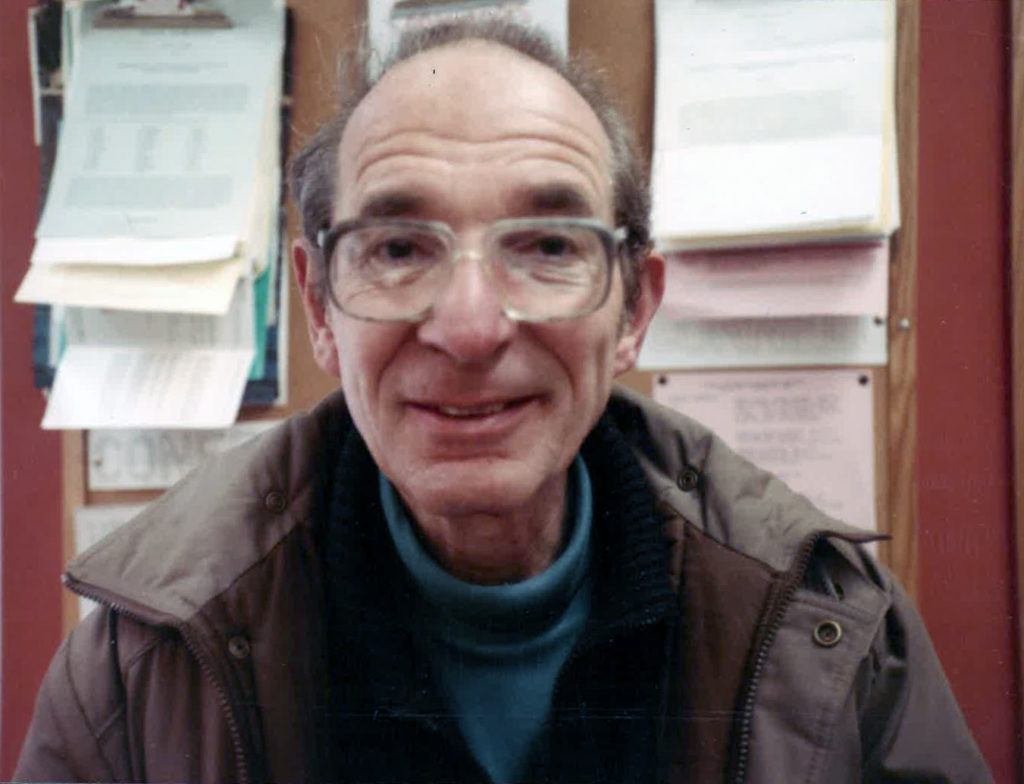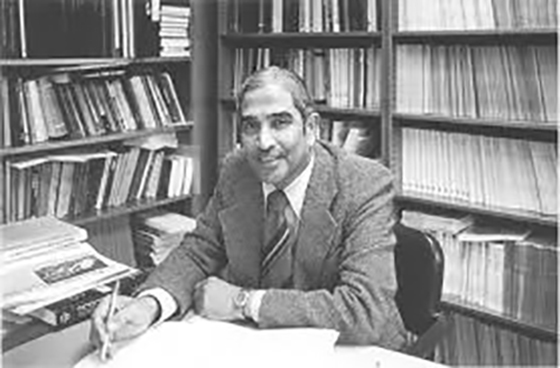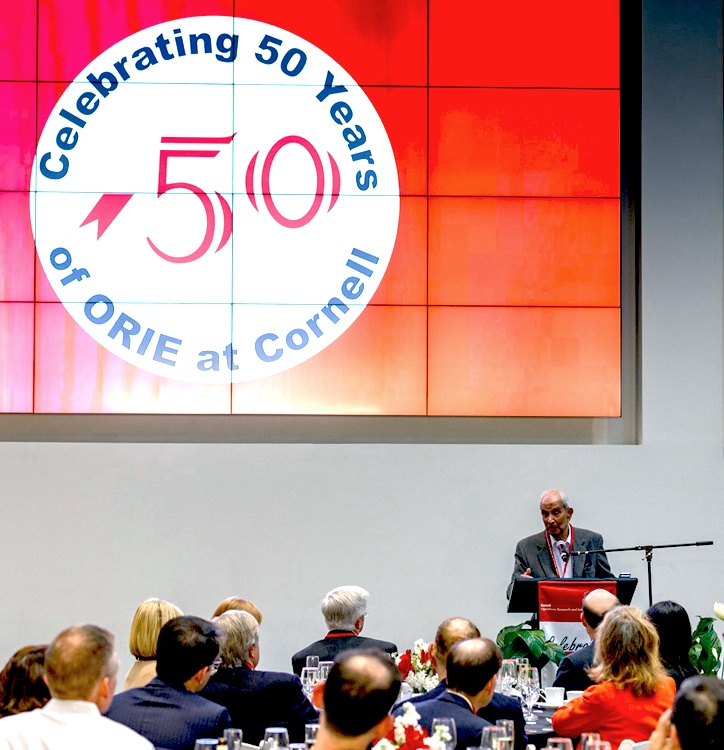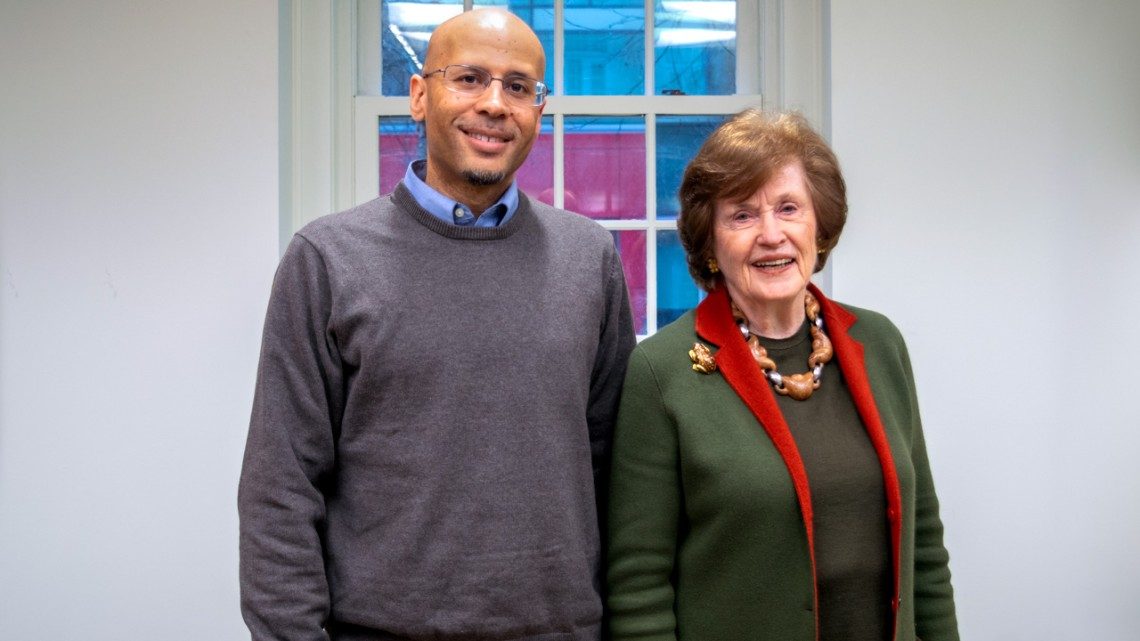Mathematician Narahari Umanath Prabhu was teaching in Australia in the early 1960s, when he wrote the book Stochastic Processes: Basic Theory and Its Applications. The publisher sent Prabhu’s book manuscript to a referee to review, and the review was so glowing that Prabhu asked to learn the name of the referee. The referee was Frank Spitzer, a math professor at Cornell.
The two men began a correspondence which led to Spitzer recommending Prabhu for a faculty position at Cornell, and to a life-long friendship. In 1965, Prabhu accepted an assistant professorship in the Department of Industrial Engineering (now called Operations Research and Information Engineering or ORIE) and moved his family to Ithaca. He was 41 years old. Prabhu was a professor in the College of Engineering from 1965 to 1994, when he became a professor emeritus.
More than 55 years later, Prabhu has honored Professor Frank Spitzer by endowing the Frank Spitzer and Narahari Umanath Prabhu Assistant Professorship of Mathematics.
Frank discovered what I was capable of, and he believed in me.

Born in 1924 in Calicut, India, Prabhu had always wanted to come to the US, but he did not hold any illusions that the streets here were paved in gold. “I knew I would have to work hard, and I knew that I could,” he says.
Prabhu earned a BA in math from Loyola College in Madras, an MA in statistics from the University of Bombay, and a MS in math at the University of Manchester in England. Prabhu didn’t have a PhD, but he never let this stand in his way. He believed that his kind of talent would be appreciated in America, because he was the sort of scholar who figured things out on his own.
Throughout his career Professor Frank Spitzer served as a mentor to Prabhu. At a seminar a few years after he arrived at Cornell, Prabhu presented a paper he had written. Frank Spitzer was in the audience and was so excited about Prabhu’s work that he immediately shared the paper with his colleague in the Department of Mathematics, Harry Kesten. “Frank could not believe this paper,” says Prabhu. Kesten read the paper and was so impressed that he offered Prabhu a position in the math department on the spot.
Although Prabhu declined the offer and remained with ORIE, he still treasures the memory of the encouragement he received from Spitzer and from the math department. “Frank discovered what I was capable of, and he believed in me,” he says.
I knew I would have to work hard, and I knew that I could.
Prabhu first became interested in queueing theory, or “how things work” as he puts it, when he was in England during WWII. He recalls residents taking shelter in underground tunnels during the air raids, waiting for the “all clear” signal. The lines to get into the underground were many and long: including those to the restrooms. Prabhu wondered how long one would need to wait to use the restrooms. Was there a way to minimize the waiting? These are the kinds of situations that queuing theory attempts to describe.
Prabhu is quick to point out that such problems never have solutions in which both sides win. Customers would like better service and so they want to see many queues, while service providers seek to economize staff and other costs by providing fewer points of service. “So the whole thing is a waiting game (also known as zero-sum game) where nobody wins,” chuckles Prabhu.
A few years after coming to the US, Prabhu received a call from a publisher about starting a journal on queueing theory. At the time, many scholars did not feel that this topic was worth pursuing. So Prabhu surveyed 20 of his American and international colleagues to see if they thought such a journal was a worthwhile endeavor. Of the 20, all but one responded affirmatively.
Prabhu co-founded and co-edited the journal Stochastic Processes and Their Applications from 1973 to 1984, with his colleague Julien Kielson from the Rochester Institute of Technology. Prabhu also served as editor of the Queueing Systems Journal, a publication which continues to this day, from 1986 to 1994.
The students I taught were my spiritual children. We are a family.

Looking back on his time at Cornell, Prabhu is proud of the fact that he helped entice his colleagues to come here. To this end, Prabhu and Kielson came up with a plan to host a series of conferences in the upstate New York region. The Committee for Conferences on Stochastic Processes subsequently mounted successful conferences in England, Canada, the US, Israel, and the Netherlands—attracting top scholars from around the world.
Prabhu also attracted top-notch students to Cornell. He recalls one student waiting outside the door for him on his first day working at Cornell. The student followed him out the door of the department and announced, “I’m Michael Rubinovitch and I want to work with you.” Prahbu was surprised that anyone knew he was at Cornell, and he gladly accepted.
Prabhu went on to teach and mentor many more students in his years at Cornell. One of his students, Haya Kaspi MS ’78, PhD ’79, fondly called Prabhu “Zayde,” the Yiddish word for Grandfather. The mother of another student, Henry M. Goldberg MS ’76, PhD ’76, sent Prabhu a letter saying, “thank you for taking care of my boy.”
At the end of each term, Professor Prabhu reminded his students to remember the world outside Cornell. He believed that their goal at Cornell was not simply to earn a piece of paper—their degree, but to figure out what they wanted to do in the wider world. He wanted them to find their life purpose.
Today, Michael Rubinovitch PhD ’69 is a professor emeritus and Kaspi is a professor at Technion- Israel Institute of Technology. Goldberg is Vice Chair of the Arizona Telecommunications and Information Council.
In America I discovered myself, body and soul.
Prabhu’s own journey was motivated by a love of learning. His search to understand the world around him led him from India, to England, to Australia, and, finally, to America. Prabhu became an American citizen in 1972, and he loves his country. “I wrote an essay called ‘Thank You, America’ straight from my heart,” says Prabhu. “In America I discovered myself, body and soul.”

In December 2018, Prabhu, now a 94-year-old Professor Emeritus, honored his friend and mentor by making a gift to the College of Arts & Sciences (A&S) to establish the Frank Spitzer and Narahari Umanath Prabhu Assistant Professorship of Mathematics. Prabhu’s gift is part of the Winokur Future Faculty Initiative, a matching gift from Bart ‘61 and Susan ‘61 Winokur intended to attract top talent to A&S by creating new endowed positions for faculty. In addition to his initial gift, which he made with appreciated securities, Prabhu is also making an estate gift for the same purpose by including Cornell as a beneficiary of a retirement account.
“Frank Spitzer brought out the best in me, and I’ve wanted to honor him for a long time,” he says.
In May 1999, Prabhu and his wife, Suman, endowed a new program within the Cornell South Asia Program. Since 2009, the Rabindranath Tagore Lecture Series in South Asian Literature has brought international authors to the university on an annual basis, for a reading and discussion. The program is free and open to all.
Prabhu looks back on the 54 years he has spent at Cornell as the best years of his life. At Cornell, he found an environment where he could exercise his intellect in the company of other thought leaders and inspire the next generation of scholars to embark on their own journeys of discovery. “Thank you, Cornell, and thank you, America!” he says with deep emotion.





